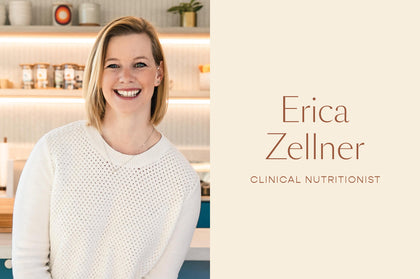As a clinical nutritionist, I’ve seen firsthand how important nutrition is for every function in our body. The human body is incredibly complex, and how well or poorly it functions will be based on many factors — and hair wellness is no exception! Some of these factors are out of our control, like our environment or genetics. But many of these factors are well within our control to modify, including our diet.
If you are noticing an increase in your normal daily shedding, it may be due to a nutritional deficiency*. Read on to learn more about common nutritional deficiencies that can cause hair loss — plus, find out what plant-based formulas can help you reach your hair goals.
Common Deficiencies That Can Worsen or Cause Hair Loss
When hair loss is a symptom for my patients, it tells me that something else is going on in the body. Hair growth is a nonessential process for the body; this means that your body will prioritize nutrients like vitamins and minerals for essential processes (like keeping your heart beating or maintaining your internal organs) over hair growth. The nutrients necessary for hair growth and strength are only allocated when all of your internal needs are first met.
Any nutritional imbalance can contribute to hair loss; however, the following vitamins and minerals are particularly important for healthy hair growth.
Iron
Iron deficiency is the most common nutritional deficiency in the world and is a well-established cause of hair loss. Iron is doubly important for our hair growth because it is critical for many processes within the body and the hair follicle. Unfortunately, because our bodies have so many essential processes that require iron, there often isn’t much left to devote to the hair lifecycle.
If you’re concerned about your iron levels, your doctor can run a simple blood test to tell you how much iron you have circulating and in storage in your body. If you need to increase your intake of iron, you can add these vegan foods regularly to help.
- Beans and legumes
- Dark leafy greens
- Nuts and seeds
- Ground linseed
- Blackstrap molasses
Zinc
Zinc is a trace mineral that plays a role in immune function, cell turnover, hormone balance, protein synthesis and many other processes within the body. As a trace mineral, we need very small amounts to meet our needs. Despite this, zinc deficiency is estimated to affect nearly 20% of people globally.
For our hair, zinc deficiency is thought to weaken the hair follicle, so the hair strand falls out earlier than it should. It’s important to note that excess zinc is also damaging to our hair. So much like Goldilocks, we need to find that “just right” balance with zinc intake. The recommended daily intake for adult women is 8 mg of zinc.
Amino Acids
Amino acids are the building blocks that make up protein, so an amino acid deficiency is generally linked to suboptimal protein intake or having too little variety in protein intake.
There are nine essential amino acids that must come from our diet, as our body cannot create them. If you’re eating a vegan or plant-based diet, you are at an increased risk for a deficiency in one or more of the essential amino acids.
Especially important for our hair growth is the amino acid lysine. In addition to supporting the body’s uptake of iron, lysine also plays a role in zinc uptake. It also acts as a precursor to keratin production. Keratin is the protein that makes up 90% of our hair strands and provides both strength and elasticity to hair.
Each essential amino acid is important for hair growth, not just lysine. This is why it’s important to seek out complete proteins or have protein variety in your diet. Complete proteins are those that have all nine essential amino acids. Incomplete proteins will have some, but not all, of the essential amino acids.
All animal-based proteins are complete proteins if you choose to include those in your diet. If animal proteins are not part of your diet, the following are also complete proteins:
- Quinoa
- Buckwheat
- Hemp
- Spirulina
- Tempeh
- Supplementation
Support Your Hair From the Inside Out With Good Nutrition
Your nutrition should come primarily from a well-balanced diet that supports you, your unique needs and your goals. However, as an insurance policy, it can be helpful to have a high-quality supplement in your routine to help fill any nutritional gaps. A targeted supplement for hair wellness, like GRO Biotin Gummies, can be an easy way to provide peace of mind. As always, please speak to your doctor or a qualified nutrition professional before starting a supplement regimen.
*Note: Hair loss can be caused by a number of clinical complications as well. If you’re concerned, please speak to your doctor. This article is for informational purposes only and may not be used to diagnose any specific nutrient deficiencies or disease states.
#include-related-slider#
More From VEGAMOUR
- Erica's 5 Must-Have Pantry Items for Healthy Hair
- 3 Ways Nutrition Impacts Your Hair
- 4 Food Choices Affecting Your Hair Health
- 5 Nutrients Your Hair Craves
- 6 Hair Wellness Habits That Start in the Kitchen




















